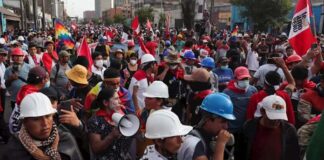A WAVE of violence by right-wing paramilitaries in Bolivia left at least 30 people dead and government buildings ransacked across the country’s eastern provinces.
The violence is the result of the escalation of a campaign by Bolivia’s wealthy landowners and industrialists to destabilise the Morales government.
Since his election two years ago President Evo Morales has moved to begin taking a larger share of the profits from the country’s oil and gas reserves to reduce inequality.
This drew the anger of Bolivian business interests and the rich, especially in the country’s eastern provinces where most of its gas reserves are located.
More recently they have been angered by plans to hold a referendum on a new constitution that would limit the size of land holdings, in a country where two thirds of the land is owned by less than one per cent of the population.
Regional governors in these provinces—known as the Media Luna—have formed an alliance to demand autonomy from Morales’ national government in an attempt to reverse his plans to redistribute the country’s wealth.
When they lost a recall referendum in August that confirmed Morales as the democratic choice of 67 per cent of Bolivians, the opposition launched a campaign of violent sabotage. In Santa Cruz, gangs of fascist youth organised in the Santa Cruz Youth Union violently seized control of or ransacked a whole series of government buildings including the tax revenue office, a newly nationalised phone company, and the land reform institute.
In another city employees of the regional governor took over the ministry of hydrocarbons office. Media outlets that criticised the right-wing opposition as well as workers and peasant organisations were also attacked.
This culminated in a massacre of peasants protesting the takeover of the airport and other buildings. When a thousand supporters of Morales marched on the capital of the province of Pando they were set upon by paramilitaries trained and paid for by the province’s governor, Leopoldo Fernandez.
President Morales’ response
In the face of this Morales finally responded, sending in the military to retake the province’s airport and throwing Ferndandez in jail after he admitted to ordering the crackdown against Morales’ supporters.
But the president has chosen to allow the opposition to maintain effective control of the major cities in the Eastern provinces outside Pando. In the face of opposition violence he has stuck to attempting negotiations with the rebel governors and ignored their use of force.
Morales has put his faith in legal mechanisms for resolving the crisis, even while the opposition has shown itself willing to ignore legal and constitutional channels and launch violent attacks against the government. After social movement organisations announced a plan to demonstrate against the rebel governor of Santa Cruz, Morales made it clear he did not want them to go ahead, saying: “I don’t agree with it and it scares me.”
But as Mark Weisbrot of the US-based Centre for Economic and Policy Research told Newsweek “the opposition has been emboldened by that. They just keep escalating.”
The aim of the right-wing opposition is clearly to topple Morales’ government. Morales himself has described their actions at an attempt at a “civilian coup”.
For now Morales’ position as president looks secure, with the Bolivian military opposing the break-up of the country and backing his nation-wide government.
But if the right-wing campaign of sabotage and destabilisation does not end, this may change.
The 1973 coup in Chile which saw the military overthrow another government that had begun limited reforms to lessen inequality should serve as a reminder of this.
If Morales makes further concessions to the right-wing opposition and the wealthy business interests they represent he will only demoralise his own supporters and encourage the rich to escalate their campaign further. The continuation of the government’s efforts to reduce the country’s rampant inequality require the millions of peasants and workers who voted for Morales to mobilise on the streets to push forward the redistribution of the country’s wealth.
Some social movement organisations are beginning to understand this, with peasant organisations setting up blockades on the major roads outside Santa Cruz to demand the return of official buildings to Morales’ government.
Most Bolivians remain desperately impoverished. If their struggle for a greater share of the country’s wealth is to succeed, they will need to step up their own mobilisations, possibly against Morales’ wishes.
By James Supple





